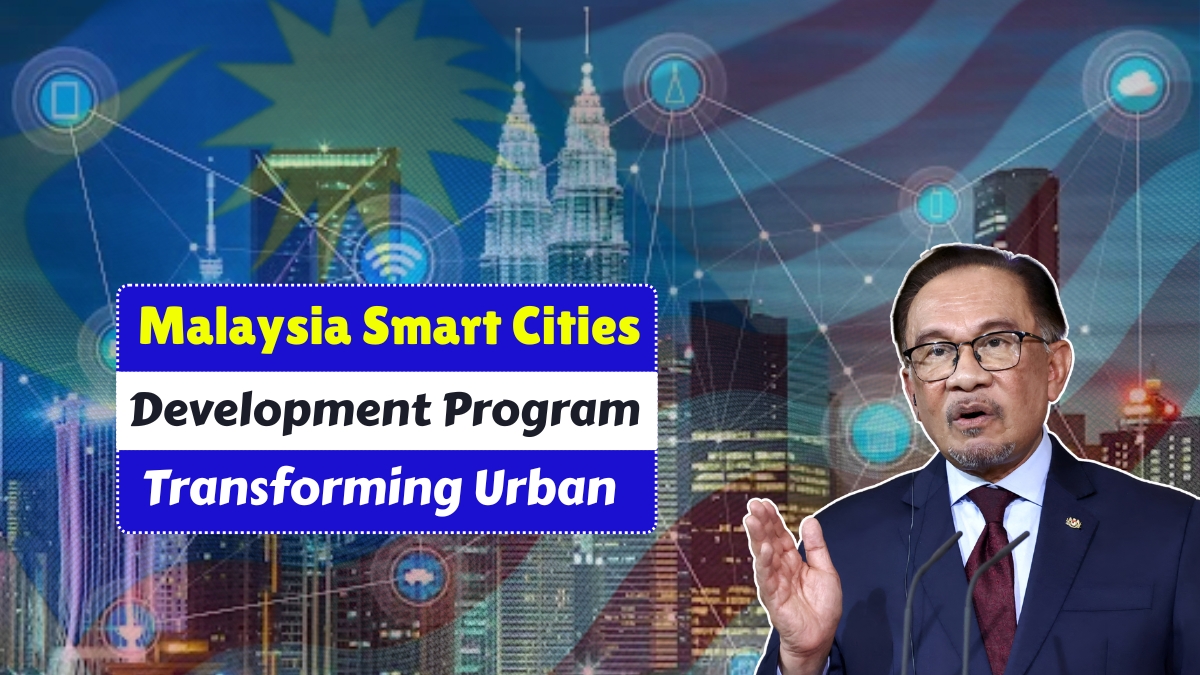Join on WhatsApp
Get the latest updates directly on WhatsApp – motivation, news & more!
Malaysia is rapidly embracing technology and innovation to enhance urban life. The Malaysia Smart Cities Development Program aims to transform cities into efficient, sustainable, and citizen-centric environments. By integrating digital infrastructure, data-driven governance, and sustainable planning, the program seeks to improve the quality of life for residents while fostering economic growth.
This article explores the objectives, key initiatives, benefits, and future impact of the Malaysia Smart Cities Development Program.
The Vision Behind Smart Cities in Malaysia
The Smart Cities initiative reflects Malaysia’s commitment to becoming a global leader in urban innovation. The government envisions cities where technology seamlessly supports transportation, energy, healthcare, safety, and public services.
The program emphasizes creating sustainable urban environments while addressing the challenges of population growth, traffic congestion, pollution, and resource management. By leveraging technology, Malaysian cities aim to become more efficient, environmentally friendly, and inclusive for all residents.
Key Components of the Program
The Smart Cities Development Program includes several core components:
- Digital Infrastructure – Expanding high-speed internet, 5G networks, and IoT devices to enable seamless connectivity across urban areas.
- Smart Governance – Using data analytics and digital platforms to improve public services, monitor city systems, and support evidence-based decision-making.
- Sustainable Urban Planning – Incorporating green building designs, renewable energy solutions, and efficient waste management to reduce environmental impact.
- Transportation Innovation – Implementing smart traffic management, integrated public transport systems, and electric vehicle support to improve mobility.
- Public Safety and Health – Utilizing AI-driven monitoring, emergency response systems, and telehealth services to protect citizens and enhance healthcare accessibility.
These components work together to ensure that cities are not only technologically advanced but also socially and environmentally sustainable.
Benefits for Citizens
The Smart Cities program offers numerous benefits to residents. Citizens enjoy improved convenience and efficiency in daily life, from faster public transport to streamlined access to government services. Digital platforms reduce bureaucratic delays, allowing residents to complete tasks such as bill payments, license renewals, and permit applications online.
Healthcare is also enhanced through telemedicine services and real-time health monitoring systems. Smart energy grids and waste management solutions contribute to cleaner and greener urban environments. Additionally, citizens gain access to data-driven safety alerts, ensuring a more secure living experience.
Economic Growth and Opportunities
Beyond improving quality of life, the program is a catalyst for economic growth. Smart Cities attract investment, create high-tech jobs, and foster innovation ecosystems. Startups and tech companies benefit from enhanced infrastructure, while local businesses gain opportunities to integrate digital solutions and expand their reach.
By promoting sustainable development, Malaysia also enhances its international competitiveness, making its cities attractive destinations for tourism, business, and talent.
Challenges in Implementation
Implementing Smart Cities initiatives comes with challenges. High initial costs, technological integration complexities, and cybersecurity concerns must be addressed. Ensuring that all citizens, including those in underserved areas, benefit equally requires careful planning and inclusive policies.
The government is collaborating with private companies, academic institutions, and international partners to overcome these challenges. Training programs for public officials and urban planners also ensure that cities are managed efficiently and responsibly.
Future Outlook
Malaysia’s Smart Cities Development Program is poised to redefine urban living. Future developments include fully automated transport systems, AI-driven healthcare networks, and sustainable energy hubs. By combining technology with environmental stewardship, Malaysian cities aim to become models of resilience and innovation.
The long-term vision is to create cities that are not only smart but also livable, equitable, and environmentally responsible. As the program progresses, residents can expect improved urban experiences, enhanced opportunities, and a higher standard of living.
Conclusion
The Malaysia Smart Cities Development Program is transforming urban life by integrating technology, sustainability, and citizen-focused solutions. From better infrastructure and healthcare to economic opportunities and environmental improvements, the program promises a brighter and smarter future for Malaysian cities.
As these initiatives continue to expand, Malaysia is positioning itself as a leader in modern urban development, demonstrating how technology and innovation can enhance the lives of all citizens while fostering sustainable growth.




